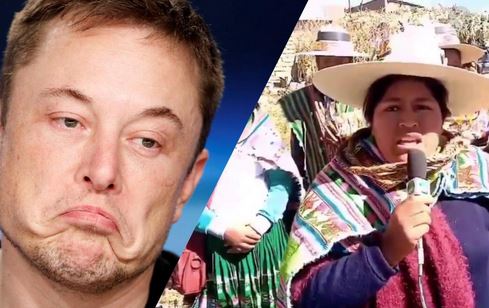By teleSUR

July 27, 2020 "Information
Clearing House" - The billionaire CEO
of Tesla and lithium-exploiting capitalist has admitted
his role in the November coup.
The CEO of the U.S.-based Telsa car manufacturer has
admitted to involvement in what President Morales has
referred to as a “Lithium Coup.”
We will coup whoever we want! Deal with it.” was Elon
Musk’s response to an accusation on twitter that the
U.S. government organized a coup against President Evo
Morales, so that Musk could obtain Bolivia’s lithium.
Foreign plunder of Bolivia’s lithium, in a country with
the world’s largest known reserves, is widely believed
to be among the main motives behind the November 10,
2019 coup.
Lithium, a critical component of the batteries used in
Tesla vehicles, is set to become one of the world’s most
important natural resources as manufacturers seek to
obtain it for use in batteries for electric cars,
computers, and industrial equipment.
|
No Advertising - No Government Grants - This Is Independent Media
|
The defacto administration of Jeanine Añez has
already announced its plan to invite numerous
multinationals into the Salar de Uyuni, the vast salt
flats in Potosi, which holds the precious soft metal.
Right-wing Vice Presidential candidate and running
mate to Añez, Samuel Doria Medina, proposed a
Brazilian-Bolivian project which would use lithium from
the town of Uyuni.
Meanwhile, letter from the coup regime’s Foreign
Minister Karen Longaric to Elon Musk, dated march 31st,
says “any corporation that you or your company can
provide to our country will be gratefully welcomed.”
Social movements have repeatedly warned that lithium
and natural resources would be surrendered to foreign
capital by coup authorities, in a reversal of plans by
Evo Morales’ Movement Towards Socialism (MAS)
administration to process the lithium within Bolivia
rather than exporting the raw material to the global
north.
The project represented a rejection of the
neocolonial relationship Latin American countries have
often had with the imperialist cores.
Bolivia’s former MAS government oversaw the
production of batteries and its first electric car by
the Yacimientos de Litio Bolivianos (YLB) state
company, in partnership with German company ACISA. In
the deal, the Bolivian state kept majority control.
With the agreement now scrapped along with countless
other state projects, and with elections now thrice
delayed by the illegitimate defacto authorities, the
people of Uyuni and social movements around the country
say they’ll continue to oppose the ongoing privatization
and are organizing against the return of looting of
Bolivia’s natural resources by ruthless and exploitative
foreign capital.
La nueva Televisión del Sur C.A. (TVSUR)
RIF
Post your comment below
The
views expressed in this article are solely those
of the author and do not necessarily reflect the
opinions of Information Clearing House.